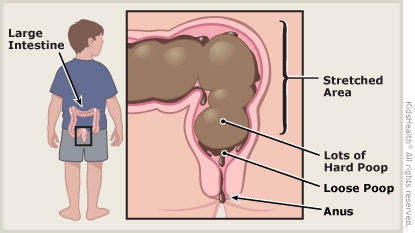Encopresis: How to Care for Your Child
Encopresis — also called soiling — is when a child who is toilet taught has loose poop leak into his or her underwear. Encopresis (en-kuh-PREE-sis) usually is caused by constipation.
Constipation means having fewer bowel movements (BMs or poops) than usual or large, hard-to-pass poops. When someone is constipated, hard poop backs up in the intestines. Encopresis happens when loose poop leaks around the hard poop.
Your child was treated in the emergency room and is ready to go home. You'll need to continue treatment at home. Treating your child's constipation will help the encopresis get better. It will take several months or longer for your child's BMs to go back to normal.


Treatment for encopresis includes:
-
a "clean-out" of the intestines (disimpaction) through taking laxatives, using stool softeners, and possibly getting an enema
-
continuing laxatives and/or stool softeners for several months or longer
-
changing diet and exercise habits
Be patient with your child. Encopresis is not something they can control.
Follow your health care provider's instructions for:
-
giving any laxatives, stool softeners, or enemas for the clean-out
-
continuing any laxatives or stool softeners after the clean-out
-
slowly stopping constipation medicines
Do not give your child any medicines, supplements, or herbs without talking to your health care provider first.
To help your child have regular BMs:
-
Add fiber to your child's diet. High-fiber foods include bran cereal, pears, strawberries, beans (such as pinto, kidney, black, or lima), and sweet potatoes.
-
Have your child drink plenty of water. Drinking juices (like prune, pear, or apple) may help too.
-
Make sure your child sits on the toilet for 5 to 10 minutes once or twice a day after eating. Kids are more likely to poop after a meal.
-
If your child tries to hold in poop, teach them that it's important to go to the toilet as soon as they feel the need. This way, poop won't build up.
-
For younger children, a sticker or a small reward can be encouraging after sitting on the toilet and/or going poop.
-
Encourage your child to be physically active.

Your child:
-
continues to have encopresis
-
doesn't poop within 2 days after making the recommended changes
-
has hard poops or pain or trouble going poop
-
has new or worsening belly pain
-
has diarrhea (watery poop)
-
starts vomiting (throwing up)
-
has a swollen belly
-
has a lot of blood on the toilet paper, in the toilet, or on the poop

Your child develops severe belly pain.

Why does treatment for constipation/encopresis take so long? Constipation stretches out the intestines. The muscles get weak and the nerves that usually tell a child it's time to poop don't work normally. It takes time (several months to a year of treatment) for the intestines to heal and start working normally again.
What does it mean if my child has blood in the poop? A small amount of blood in the poop isn't a sign of something serious. It happens when someone is constipated and they strain and push to get the hard poop out. The hard poop stretches and cracks the skin of the anus (the hole where the poop comes out).